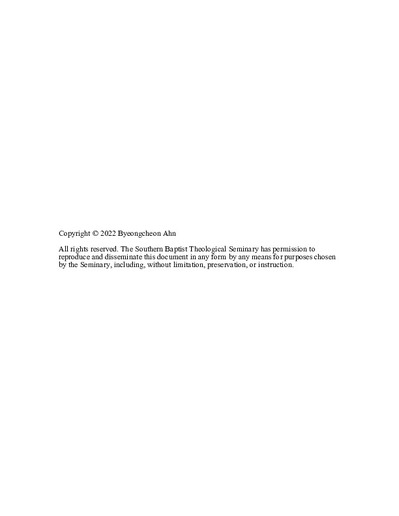| dc.description.abstract | Chapter 1 presented the thesis and purpose of this research. Throughout his life, John Owen vindicated an anti-Pelagian soteriology through divine and human agencies in the covenant. Owen was anti-Pelagian despite his emphasis on human agency in the covenant because of the divine agency of the Spirit. Owen was anti-Pelagian not despite but because of divine sovereignty.
Chapter 2 examined the anti-Pelagian soteriology of Owen in his life and ministry. Examining the life and ministry of Owen was necessary to understand how he developed his anti-Pelagian soteriology. Owen considered theology as a comprehensive means to exercise faith. Other areas were important as well, but they served a greater purpose. For Owen, theology had political implications, but theology was more than political.
Chapter 3 examined the anti-Pelagian soteriology of Owen in his covenant theology. He regarded covenant theology as a theological basis for anti-Pelagianism. Examining the covenant theology of Owen was necessary to understand how he operated in the Reformed tradition. While Owen pursued an anti-Pelagian reformation, his teachings were grounded in tradition. Reformed theologians utilized covenant theology as an interpretive tool to harmonize divine sovereignty and human responsibility.
Chapter 4 examined the anti-Pelagian soteriology of Owen in his polemics against Arminianism. Examining the views of Arminius was necessary to understand Owen’s positional anti-Arminian stance regarding predestination. Though Arminius was anti-Catholic, Reformed theologians considered Arminius a threat. For Owen, Arminianism was ultimately Pelagianism. In his response, Owen regarded predestination as a theological basis for anti-Pelagianism against Arminians.
Chapter 5 examined the anti-Pelagian soteriology of Owen in his polemics against Socinianism. Examining the development of Socinianism was necessary to understand why Owen defended the Trinity against Socinian teachings. For Owen, vindicating the Trinity was his basis for anti-Pelagian polemics against Socinians. Owen argued that the Trinity was the foundation of covenant theology in their tradition.
Chapter 6 examined the anti-Pelagian soteriology of Owen in his affirmative teachings of human agency. Examining his teaching on human agency was essential in understanding how the Spirit worked in the covenant. As an anti-Pelagian, Owen argued that believers exercised an anti-Pelagian human agency through covenantal pneumatology. | en_US |

